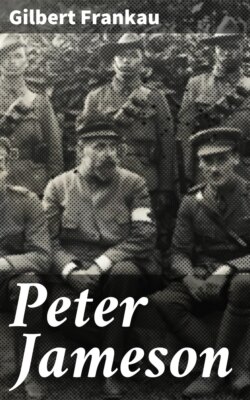Читать книгу Peter Jameson - Gilbert Frankau - Страница 37
На сайте Литреса книга снята с продажи.
§ 3
ОглавлениеTable of Contents
Nevertheless, the interview left its mark in more ways than the pencilled notes “Post F’s letters” in Peter’s business-diary.
Two more weeks drifted by; news, unsatisfactorily scanty at the beginning, grew unsatisfactorily complete. So far, the enemy had it all their own way. Business, on the other hand, showed a tendency to revive—Nirvana business especially. With the economies effected, a little more trade—provided nothing interfered with their exports—would ensure them against actual loss. Bramson had cheered up, Simpson and the cigar-business dropped back into their usual lethargy. But our Mr. Jameson, for the first time in years, felt himself lacking in concentration.
This lack of concentration, as he carefully explained to himself, was in no wise due to the bad news. As an Englishman, and one who vaguely recollected the South African campaign, he had never expected a walk-over. Things looked pretty bad at the moment. Paris might possibly fall—though it hardly seemed likely. That would be awkward, of course: but by no means an irretrievable disaster. …
Nor, he decided, had business anxieties affected his grip of things financial. Nirvana could be saved. The main problem had been grappled with. Now—granted his continued personal attention—it was only a question of patience. … Then, why the devil this strange inability to concentrate, this growing annoyance?
A good many people had begun to annoy Peter—Julius Hagenburg among others. The man, proud possessor of a British naturalization certificate taken out in 1912, had of course every right to change his name if he thought fit. But Peter could not get accustomed to him as “James Hartopp, Esq.” And his loud-mouthed patriotism, even though he had squared off almost all his old account, and given a large order, somehow offended.
There were a good many such naturalized Germans in the Havana cigar-trade; many of them with sons who had already enlisted. But every time he met one of them—old Schornstein, for instance, with his “Ve must vait and see, my poy. Ve must vait and see,” or Blumberg eager to explain that “De liperal barty had saved de gountry,”—Peter experienced a new prejudice.
But Jameson’s connexion with Beckmanns provided the crowning annoyance of all. Peter and Simpson had decided—as soon as the legal position became clear—that it would be ridiculous to stop importing the brand immediately. They must, of course, do their best to replace the goods with those of another factory. On the other hand, to give them up without finding a substitute, would merely mean turning over an important advantage to some less-scrupulous competitor.
Still—whatever the “Proclamation as to trading with the Enemy” might say about “firms domiciled in neutral countries”—Peter could not get out of his mind that the actual owners of the concern were Germans. Every Friday afternoon, as Simpson dictated his careful letter to them, ending with the old stereotyped phrasing “with kind regards, Yours very sincerely,” Peter would remember Heinrich Beckmann, in his heavy boots, his black tail-coat, his hard bowler-hat, iron-moustached and curt of phrase, gobbling oysters and swilling wine at Fortis’; would see young Albert Beckmann, fat, flabby, blond, over-manicured, frothing glass at his lips, eyeing the Tänzerinnen in the gaudy night-club where they had celebrated the signing of the contract. “Huns,” Peter would say to himself—(the appellation “Hun” had just come into vogue)—“bloody Huns!”
